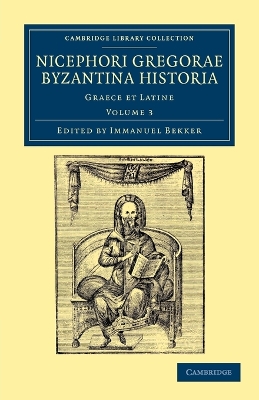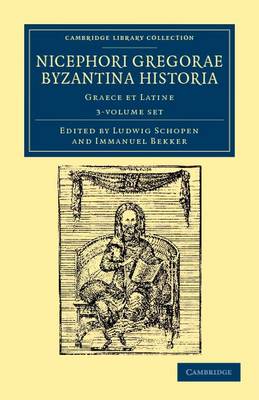Cambridge Library Collection - Medieval History
1 primary work • 5 total works
Volume 1
This three-volume edition, in Greek with Latin translation, of the History by Nicephorus Gregoras (c. 1295–1360) was edited by Ludwig Schopen (Volumes 1 and 2, 1829–30) and Immanuel Bekker (Volume 3, 1855). The astronomer and historian, Gregpras, became the archivist of the Byzantine Emperor Andronikos II Palaiologos (to whom he proposed a calendar reform similar to that adopted by Pope Gregory XIII in 1582), and was involved in the fruitless negotiations of 1333 to unite the Greek and Latin Churches. The thirty-seven books of Gregoras' History overlap with the work by George Pachymeres, and continue the narrative to 1359. This period is also covered in the History by the ex-Emperor John Cantacuzene, and both these authors are also reissued in this series. Volume 3 describes the overthrow of John VI, his withdrawal to a monastery, and the accession of John V Palaiologos, the son of Andronikos III.
Nicephori Gregorae Byzantina historia 3 volume Set
by Nicephorus Gregoras
Published 16 February 2012
This three-volume edition of the History by Nicephorus Gregoras (c. 1295-1360) was edited by Ludwig Schopen (Volumes 1 and 2, 1829-30) and Immanuel Bekker (Volume 3, 1855). The astronomer and historian, Gregoras, became the archivist of the Byzantine Emperor Andronikos II Palaiologos (to whom he proposed a calendar reform similar to that adopted by Pope Gregory XIII in 1582), and was involved in the fruitless negotiations of 1333 to unite the Greek and Latin Churches. The thirty-seven books of Gregoras' History overlap with the work by George Pachymeres, and continue the narrative to 1359. This period is also covered in the History by the ex-Emperor John Cantacuzene, and both these authors are also reissued in this series. Gregoras' History includes the deposition of Andronikos II by his grandson Andronikos III, the latter's death, the accession of John VI Cantacuzene, and the eventual retirement of John to a monastery.
This three-volume edition, in Greek with Latin translation, of the History by Nicephorus Gregoras (c. 1295-1360) was edited by Ludwig Schopen (Volumes 1 and 2, 1829-30) and Immanuel Bekker (Volume 3, 1855). The astronomer and historian, Gregpras, became the archivist of the Byzantine emperor Andronikos II Palaiologos (to whom he proposed a calendar reform similar to that adopted by Pope Gregory XIII in 1582), and was involved in the fruitless negotiations of 1333 to unite the Greek and Latin Churches. The thirty-seven books by Gregoras' History overlap with the work by George Pachymeres, and continue the narrative to 1359. This period is also covered in the History by the ex-Emperor John Cantacuzene, and both these authors are also reissued in this series. Volume 2 begins in 1341, with the events following the death of Andronikos III, and ends in 1351, during the troubled reign of John VI Cantacuzene.
This three-volume edition of the History by Nicephorus Gregoras (c. 1295-1360) was edited by Ludwig Schopen (Volumes 1 and 2, 1829-30) and Immanuel Bekker (Volume 3, 1855). The astronomer and historian, Gregpras, became the archivist of the Byzantine Emperor Andronikos II Palaiologos (to whom he proposed a calendar reform similar to that adopted by Pope Gregory XIII in 1582), and was involved in the fruitless negotiations of 1333 to unite the Greek and Latin Churches. The thirty-seven books of Gregoras' History overlap with the work by George Pachymeres, and continue the narrative to 1359. This period is also covered in the History by the ex-Emperor John Cantacuzene, and both these authors are also reissued in this series. The Latin introduction to Volume 1 includes a life and bibliography of Gregoras, and the Greek text (with Latin translation) begins with the capture of Constantinople by the Franks in 1204.
This three-volume edition, in Greek with Latin translation, of the History by Nicephorus Gregoras (c. 1295-1360) was edited by Ludwig Schopen (Volumes 1 and 2, 1829-30) and Immanuel Bekker (Volume 3, 1855). The astronomer and historian, Gregpras, became the archivist of the Byzantine Emperor Andronikos II Palaiologos (to whom he proposed a calendar reform similar to that adopted by Pope Gregory XIII in 1582), and was involved in the fruitless negotiations of 1333 to unite the Greek and Latin Churches. The thirty-seven books of Gregoras' History overlap with the work by George Pachymeres, and continue the narrative to 1359. This period is also covered in the History by the ex-Emperor John Cantacuzene, and both these authors are also reissued in this series. Volume 3 describes the overthrow of John VI, his withdrawal to a monastery, and the accession of John V Palaiologos, the son of Andronikos III.


